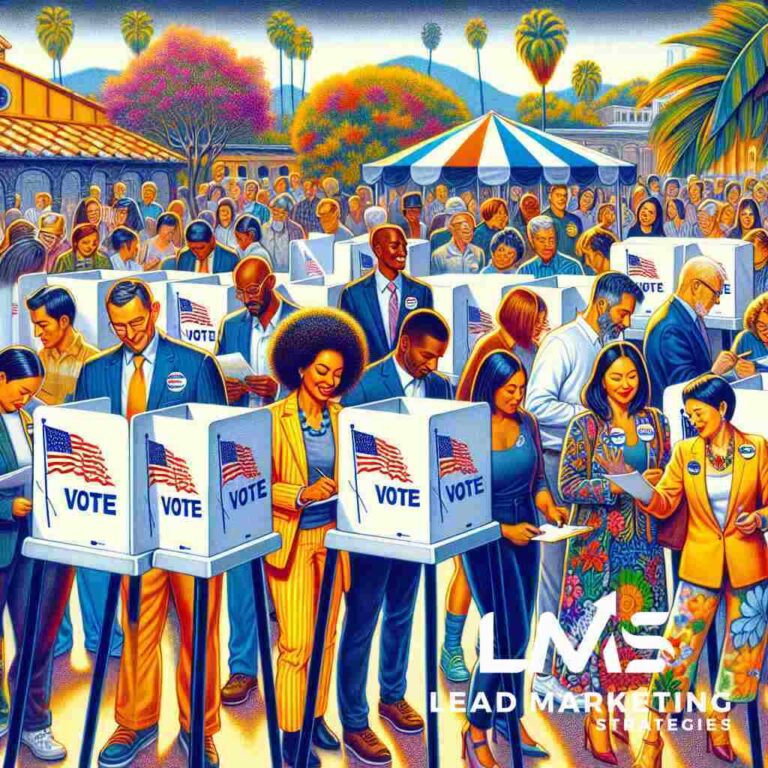Compare the Best Political Influencing Tactics Today
Introduction to Political Influence in the Digital Age
Digital Revolution in Political Campaigning
In today’s fast-paced digital landscape, the political arena has undergone a seismic transformation. Political campaigns have embraced the digital political marketing techniques that were once deemed futuristic. The proliferation of new media platforms allows for a more agile and dynamic interaction with voters, enabling candidates to wield influence with unprecedented precision. From social media political influence campaigns to SEO services for political campaigns, the avenues for digital outreach are diverse and potent.
This digital revolution empowers campaigns to efficiently target specific demographics, tapping into potential voter bases that were previously elusive. As a result, campaigns are more data-driven than ever, using voter data analysis innovation to personalize messages and optimize outreach. The democratization of information means voters expect real-time updates, and campaigns that effectively harness digital tools to manage this expectation thrive.
Understanding Voter Persuasion Methodologies
The art of persuasion in politics has been refined and redefined by technological advancements. Modern political campaign strategies leverage data analytics to discern voter sentiment and craft messages that resonate deeply. Enhanced voter engagement tactics in political campaigns depend on understanding voter psychology and addressing their expectations and concerns succinctly.
At the heart of these methodologies is personalization, a strategy that allows for tailored communications that stand out in the cluttered digital space. Political communication tactics have evolved to ensure messages are not only heard but also remembered. Utilizing the full suite of available channels, campaigns can now navigate the complex voter landscape with surgical precision.
Comparative Political Analysis: Past and Present
A retrospective look at political campaigning highlights stark contrasts between past approaches and modern practices. Historically, traditional media dominated the political discourse, offering limited interaction with voters. Today’s campaigns, however, thrive on instant communication and feedback, made possible through cross-platform political outreach strategies.
The role of AI in political campaigns further delineates present strategies from those of previous generations. Leveraging AI allows for enhanced electoral influence optimization by analyzing large datasets to predict voter behavior and preferences. By comparing these methodologies, it becomes clear that modern campaigns prioritize adaptability and personalization, pivotal in crafting political message crafting strategies that win elections.
Building a Political Brand: Crafting the Narrative
Political Narrative Crafting for Modern Campaigns
In the modern political landscape, crafting a compelling narrative is crucial for political message crafting strategies. A well-developed narrative acts as the backbone of political campaigns, offering candidates a platform to express their values and policies effectively. This requires a precise blend of authenticity and relatability, enabling candidates to connect with a diverse voter base. With strategic messaging, political marketing services can help transform a candidate’s vision into a resonant message that transcends traditional communication barriers.
Political narratives also serve to humanize candidates, allowing them to demonstrate empathy and understanding of voters’ needs. By embracing digital storytelling, modern political strategies ensure the campaign narrative is both impactful and memorable. This approach extends beyond mere rhetoric; it requires a comprehensive understanding of political sentiment analysis to craft messages that truly resonate both intellectually and emotionally with voters.
Brand Development: Creating an Electorally Resonant Image
Building a political brand involves establishing a strong, recognizable identity that voters can trust. Political branding encapsulates not just party affiliations but the essence and aspirations of a candidate, shaping how they are perceived in the public eye. Engaging in political branding techniques such as creating a unique visual identity, employing consistent messaging, and ensuring all communications align with the political brand identity is essential.
The process of enhancing political brand identity should strategically highlight a candidate’s strengths and differentiate them from opponents. This involves careful voter data analysis to discern target demographics and to tailor campaigns that appeal specifically to these segments. Effective political advertising strategies can amplify a candidate’s image, reinforcing key messages across various platforms to build recognition and trust.
Crafting Strategic Voter Segmenting through Storytelling
Strategic voter segmenting is an art that marries data-driven insights with compelling storytelling. Campaigns that successfully segment their voter base can deliver targeted messages that appeal to different voter groups. This requires understanding the nuanced needs and concerns of diverse voter demographics. Through personalized digital marketing for political campaigns, campaigns can communicate directly with specific segments, ensuring high relevance and engagement.
Storytelling plays a crucial role in segmenting voters, helping to underscore shared values and common goals. By crafting narratives that resonate with various voter groups, campaigns can establish emotional connections that enhance voter loyalty. The key lies in using strategic voter segmenting as a tool to unite diverse voter interests under a common campaign theme, ultimately driving political engagement analytics to new heights.

Harnessing Data for Targeted Influence
Data-Driven Political Tactics: Enhancing Campaign Effectiveness
In today’s politically dynamic world, data-driven tactics are vital for enhancing campaign effectiveness. Campaigns now lean on sophisticated political advertising campaigns that use extensive voter data analysis to refine their strategies. By analyzing demographic information and historical voting patterns, campaigns can craft precise messages tailored to resonate with specific voter segments. This strategic use of data not only heightens outreach efficacy but also ensures resources are allocated efficiently, thus maximizing campaign impact. Through constant adaptation and feedback loops, data-driven approaches keep campaigns agile and responsive.
Data-centric strategies are reshaping how political organizations drive engagement. By tapping into real-time analytics, campaigns can swiftly identify shifting voter trends and recalibrate their tactics accordingly. This level of responsiveness is unmatched and allows for the creation of highly targeted and effective communication plans that appeal to the issues that matter most to different community segments.
Voter Data Analysis and Microtargeting Techniques
The evolution of voter data analysis innovation continues to refine microtargeting techniques in political campaigns. By dissecting complex datasets, campaigns can now identify nuanced voter profiles and preferences to craft tailored messaging that addresses specific concerns and motivations. This level of granularity in voter targeting was previously unattainable, marking a significant advancement in campaign methodologies.
Microtargeting empowers political strategies to deliver personalized messaging across various channels, ensuring the right message reaches the right audience at the optimal time. Such precision allows campaigns to significantly improve their engagement rates and voter turnout. By focusing on key segments, campaigns can mobilize supporters efficiently and sway undecided voters by directly addressing their personal interests and community issues.
Electoral Influence Optimization through Demographic-Targeted Ads
Optimizing electoral influence through demographic-targeted ads represents a major leap in modern campaign strategy. By leveraging insights from data analytics, campaigns can design ads that zero in on very specific voter segments, enhancing the relevance and impact of political advertising. These ads can be crafted to appeal not only to broad demographic groups but also to niche communities, increasing electoral reach and resonance.
Local political campaign marketing near New York exemplifies the strategic deployment of such targeted advertising techniques. Through platforms that allow hyper-localized ad placements, campaigns engage voters with context-sensitive messages that reflect community-specific priorities. This approach not only optimizes reach and influence but also bolsters brand loyalty among constituents by reflecting an astute understanding of their unique political landscapes.
Cross-Platform Political Outreach: Expanding Influential Reach
Utilizing Social Media Political Influence in Campaigns
Social media has become an indispensable tool in modern political strategies, providing a platform for real-time interaction and feedback. Campaigns can harness social media political influence campaigns to engage voters, disseminate key messages, and create a sense of community among supporters. Platforms like Facebook, Twitter, and Instagram allow for immediate responses to political developments, making it easier for campaigns to stay relevant and responsive.
Social media platforms offer targeted advertising opportunities, allowing campaigns to engage specific voter demographics with tailored messages. This precision in targeting enhances the effectiveness of political marketing optimization services by ensuring that campaigns reach the most relevant audiences. By integrating analytics tools, campaigns can track engagement metrics, optimize their content strategy, and ultimately improve voter outreach and engagement.
Expanding Political Outreach Through Multi-Channel Marketing
To achieve comprehensive electoral influence, campaigns must diversify their communication strategies across multiple channels. Expanding political outreach through multi-channel marketing involves creating a cohesive and synchronized message that resonates across diverse platforms. This approach includes traditional media, digital advertising, direct mail, and public appearances to ensure maximum voter interaction.
The efficacy of multi-channel marketing lies in its ability to engage voters at various touchpoints, amplifying the campaign message’s reach and impact. By understanding each channel’s unique audience and tailoring messages accordingly, campaigns can leverage cross-platform political outreach strategies near Washington to build a pervasive presence. Consistent messaging across platforms ensures unified branding and reinforces campaign objectives, ultimately increasing voter awareness and support.
Innovative Grassroots Mobilization Tactics for Real-Time Engagement
Grassroots mobilization remains a cornerstone of effective political campaigning, enabling candidates to connect with voters on a personal level. Today, innovative tactics have revitalized this traditional approach by integrating digital technology to facilitate real-time engagement. By using mobile apps, social media, and text messaging, campaigns can organize grassroots activities that are immediate, coordinated, and responsive.
These modern tools help campaigns swiftly rally supporters, coordinate event logistics, and disseminate information. Innovative grassroots mobilization tactics allow campaigns to operate with agility, adapting to changing political climates and voter needs rapidly. By employing data-driven insights, campaigns can target specific communities with tailored outreach efforts, fostering a sense of inclusion and participation among voters. Such engagement not only galvanizes support but also bolsters voter engagement boosting strategies that drive higher voter turnout and strengthen democratic participation.

Dynamic Voter Interaction: Personalization and Engagement
Adaptive Political Campaigning in Real-Time Environments
In the modern political landscape, adaptive political campaigning is essential for engaging with voters in real-time. Campaigns must remain agile and ready to respond to breaking events and shifting voter sentiment, which can change rapidly. Leveraging political marketing optimization services allows campaigns to track and engage with voters instantly, adjusting strategies as necessary to maintain relevance and resonance. This real-time responsiveness is essential for capturing the fleeting attention of voters and maintaining a vibrant campaign presence.
For the most effective engagement, campaigns use tools and platforms that provide immediate feedback and analytics, enabling them to adapt messages and strategies. This approach ensures a dynamic dialogue with the electorate, crucial for building sustained voter engagement. As the political arena becomes increasingly fast-paced, the ability to pivot and react in real-time becomes a defining mark of successful campaigns.
Digital Political Marketing: Personalized Voter Experiences
Digital political marketing stands as a cornerstone for creating personalized voter experiences that foster deeper connections with constituents. By utilizing voter data and analytics, campaigns can tailor messages that resonate more profoundly with individual voter concerns, thus bridging the gap between candidates and constituents. Personalized digital interactions not only improve voter retention but also encourage deeper involvement in the political process.
Campaigns that masterfully employ personalization tactics can increase their influence by crafting unique messaging strategies that address specific voter needs and preferences. The integration of SEO services for political campaigns is crucial in ensuring these personalized messages reach the intended audience, optimizing search engine visibility, and enhancing the overall reach and impact of the campaign.
Electoral Psychology Strategies for Enhanced Engagement
Understanding electoral psychology is crucial for devising effective strategies that enhance voter engagement. By examining the psychological factors that influence voter behavior, campaigns can craft messages and strategies that resonate on a deeper emotional level. This enables campaigns to address both the conscious and subconscious motivations of voters, thereby enhancing the crafting of effective political messages.
Electoral psychology strategies often involve tapping into shared values and emotions, thereby fostering a sense of belonging and connection among voters. This approach can be augmented through political engagement analytics, which provide insights into the emotional responses to campaign communications. Such data-driven insights enable the refinement of tactics to ensure maximum engagement and a stronger connection between voters and candidates. By fully leveraging these strategies, campaigns can secure not just votes but lasting loyalty and advocacy from their supporter base.
Crafting Effective Political Messaging and Communication
Election Communication Techniques for Voter Resonance
In the competitive arena of political campaigns, mastering effective political communication techniques is essential for resonating with voters. A key strategy involves leveraging emotional appeals and narrative structures that foster relatability and memorability among constituents. By utilizing SEO services for political campaigns, politicians can ensure their messages surface prominently in search results, amplifying their reach and impact.
Moreover, consistently utilizing cross-platform communication bolsters message visibility. Utilizing platforms such as social media, email, and direct mail enables a multifaceted approach that resonates with diverse voter groups. This strategy ensures messages are not only prominent but also adapted to the preferences of each unique audience. Effective communication builds trust and credibility, two crucial factors in winning voter support and engagement.
Election Campaign Management and Strategic Messaging
Strategic messaging lies at the heart of effective election campaign management. Crafting messages that are succinct yet impactful requires an understanding of both the political landscape and voter psychology. Utilizing political marketing services, campaigns can optimize their messaging strategies to reflect timely and relevant issues, thereby aligning closely with voter priorities and preferences.
These messaging strategies revolve around highlighting key policy positions, personal candidacy attributes, and the candidate’s vision for the future. They are often tailored through political PR services that manage public perception and media relations. By maintaining a consistent and clear message across all channels, campaigns build a strong, cohesive identity that resonates with voters. This strategic consistency not only enhances recognition but also fosters a deeper emotional connection with the electorate.
Achieving Campaign Message Resonance through Data Insights
To achieve meaningful campaign message resonance, leveraging data-driven political tactics is essential. Analyzing voting patterns, demographic data, and social media interactions offers campaigns valuable insights into what issues matter most to their constituents. The role of AI in political campaigns is pivotal in distilling these insights into actionable strategies.
Through sophisticated voter data analysis, campaigns can refine their messaging to ensure it aligns closely with voter sentiments and regional concerns. Data insights enable the creation of tailored messages that cater to specific voter segments, thereby maximizing engagement and support. Such precision in messaging guarantees that the campaign remains relevant and impactful, effectively converting voter interest into electoral success.
Campaigns today thrive on agile messaging strategies that integrate real-time data to remain responsive to the ever-evolving voter landscape. This capability transforms data into a powerful tool for strategic messaging, enabling campaigns to adapt swiftly and offer resonant messaging that upholds their overall electoral goals.
Concluding Thoughts on Influencing Tactics and Future Trends
Looking Ahead: Future of Political Campaign Strategies
As we look to the future of political campaign strategies, it is evident that the landscape will continue to evolve at a rapid pace. The integration of technology and data analytics will play an even more pivotal role, with campaigns seeking to refine their approaches through advanced political marketing optimization services. This will enable them to craft messages that are both precise and impactful, ensuring that they resonate with an increasingly diverse electorate. Moreover, the use of AI and machine learning will enable real-time adaptations in campaign tactics, allowing for the effective addressing of voter concerns and preferences as they emerge.
Campaigns will also need to prioritize transparency and authenticity as voters demand accountability and openness from their leaders. Cultivating trust and fostering genuine connections with constituents will be paramount. As strategies become more sophisticated, political entities must remain attuned to the ethical implications of their influence tactics, ensuring their methods align with democratic principles and the public interest.
Emerging Trends in Digital Political Influence
The emergence of new technologies and platforms promises to redefine digital political influence. With the rise of the lead marketing strategies app for iOS, campaigns can manage digital interactions more effectively, leveraging mobile technology to maintain direct communication with potential voters. This innovation underscores the increasing importance of mobile-first strategies in political outreach.
Moreover, with the growing prevalence of online advertising in political campaigns, the focus on creating engaging and interactive content will become more crucial. Augmented reality experiences, live-streaming events, and virtual town halls will transform how candidates engage with their audiences, making politics more accessible and participative. As digital landscapes continue to expand, political campaigns will have more tools at their disposal to creatively and effectively engage with their audience.
Summarizing the Future of Voter Engagement
Summarizing the future of voter engagement, it is clear that personalization and adaptability will continue to be key. Campaigns will increasingly utilize demographic-targeted political ads to connect with voters on a personal level, ensuring alignment with their values and interests. As technology enables more precise targeting, the potential for increased voter turnout and engagement is substantial.
Furthermore, as voter expectations continue to evolve, campaigns must remain agile, prepared to innovate and adapt their strategies to shifting political climates and cultural contexts. By prioritizing meaningful engagement, campaigns can not only secure electoral victories but also foster lasting dialogue with their communities. The future promises to be one where campaigns are more interactive, inclusive, and engaged, driving forward the democratic process and enhancing societal participation in governance.
Frequently Asked Questions
Question: What are some modern political strategies that Political Marketing Strategies recommend for optimizing electoral influence?
Answer: At Political Marketing Strategies, we focus on a blend of innovative campaign tactics, digital political marketing, and grassroots mobilization to enhance electoral influence. By leveraging data-driven political tactics and targeting demographic-specific ads, we can effectively reach specific voter segments. Our political engagement analytics provide real-time insights, allowing adaptive political campaigning and ensuring your message resonates across diverse platforms.
Question: How can campaigns effectively use social media political influence according to Political Marketing Strategies?
Answer: Social media provides a powerful avenue for real-time voter interaction. With tailored social media political influence campaigns, we help clients engage voters directly and dynamically. Our expertise in election social media marketing ensures that campaigns use platforms like Facebook, Twitter, and Instagram to reach and engage their target audiences, providing tailored messages that align with voter interests and concerns.
Question: In the blog post Compare the Best Political Influencing Tactics Today, what role does political narrative crafting play in modern campaigns?
Answer: Political narrative crafting is essential for shaping a compelling political brand in today’s digital age. In the blog, we emphasize the importance of developing a relatable and authentic narrative that reflects a candidate’s core values and policy positions. At Political Marketing Strategies, we use political brand development and storytelling to connect with voters on an emotional level, ensuring that a candidate’s vision transcends traditional communication barriers and resonates with diverse voter demographics.
Question: What is the significance of data-driven political tactics in election campaign management, as highlighted by Political Marketing Strategies?
Answer: Data-driven political tactics are crucial for precise and effective election campaign management. By analyzing extensive voter data, we can develop targeted political campaign personalization strategies that resonate with specific voter segments through clear, effective messages. This approach maximizes voter engagement and ensures resources are utilized efficiently. Our political marketing services focus on continually adapting to voter feedback, enhancing campaign effectiveness, and optimizing electoral influence.
Question: How do adaptive political campaigning techniques enhance voter engagement according to Political Marketing Strategies?
Answer: Adaptive political campaigning is about remaining agile and responsive to changing voter sentiments and political landscapes. At Political Marketing Strategies, we employ real-time political adaptation approaches using comprehensive electoral analytics. This ensures campaigns maintain relevance and effectively engage with constituents by adjusting strategies to current events and shifts in the political climate. Such adaptability is key to dynamic voter interaction and sustaining long-term voter trust and support.


